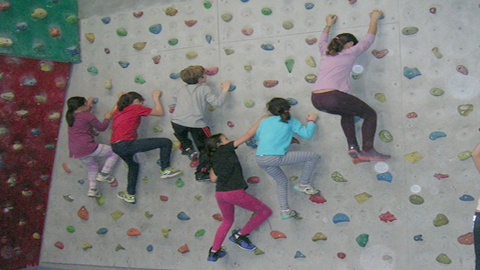Children who do out-of-school sports for up to 5 hours per week and sleep 9 to 10 hours get better marks

14/10/2015
On the other hand, the worst academic results are linked to inappropriate rest patterns (less than 9–10 hours) and a large number of physical and sports activities (over 5 hours per week).
Going to bed late and getting up early has a negative effect on academic performance. The study warns that insufficient and irregular nightly rest patterns are becoming more and more frequent in children and adolescents. This could explain why pupils are often half-asleep in early-morning lessons and have difficulties in paying attention. In fact, going to bed after 10 p.m. is shown to make it difficult for children to be at their best when they get up in the morning.
Children of this age are seen to take part in a large number of out-of-school activities: 84.2% of the population in this study engage in them. Out-of-school sports or other physical or sport activities do have a series of benefits: greater self-esteem and self-confidence and better social development, cognitive development and academic performance. Furthermore, the study's findings suggest that practising a sport reduces stress, anxiety and depression and that it boosts learning and improves memory, all of which are factors in attaining optimal health and raising academic performance.
However, this is true only up to a certain point. In fact, on a graph the effects form an inverted U, with negative effects both from doing no out-of-school activities and from doing over five. The subjects in which primary-school children's performance is boosted the most by out-of-school sports activities are Mathematics and Foreign Languages, precisely the ones that demand most attention. The best academic performance is attained by engaging in moderate physical or sports activity (two to five hours per week), while the worst corresponds to excessive activity.
All these findings highlight the importance of "making families and teachers aware that children should practise sports or other physical activities from an early age, but in moderation (no more than five hours per week), as this contributes to favourable rest patterns and better performance at school", explains Ramon Cladellas, UAB lecturer and one of the authors of the study.
The study, published in the journal Revista de Psicología del Deporte, suggests that, on the basis of its findings, the educational authorities should contemplate the need to include more hours of physical activity in school timetables.
Their conclusion is an important one as this is the first study to focus jointly on how rest patterns and out-of-school sports activities can affect academic performance, rather than looking at each one separately, as has been done up to now.
The study, entitled “Night-rest patterns, extracurricular sports activities and academic achievement in primary education students”, is based on responses from 537 primary schoolchildren (313 boys and 260 girls), from 18 schools (9 state-funded and 9 semi-private) in districts of Barcelona and Majorca. It made use of a questionnaire to gather both quantitative and qualitative data regarding rest patterns and out-of-school activities.
The authors of the study are researchers Ramon Cladellas, Mercè Clariana, Mar Badia and Teresa Dezcallar of the Department of Basic, Evolutionary and Educational Psychology of the UAB, and Concepció Gotzens, of the Department of Applied Pedagogy and Educational Psychology of the UIB.
ORIGINAL ARTICLE: "Patrones de descanso, actividades físico-deportivas extraescolares y rendimiento académico en niños y niñas de primaria" (Revista de Psicología del Deporte: Ramon Cladellas Pros, Mercè Clariana Muntada, Concepció Gotzens Busquets, Mar Badia Martín and Teresa Dezcallar Sáez).